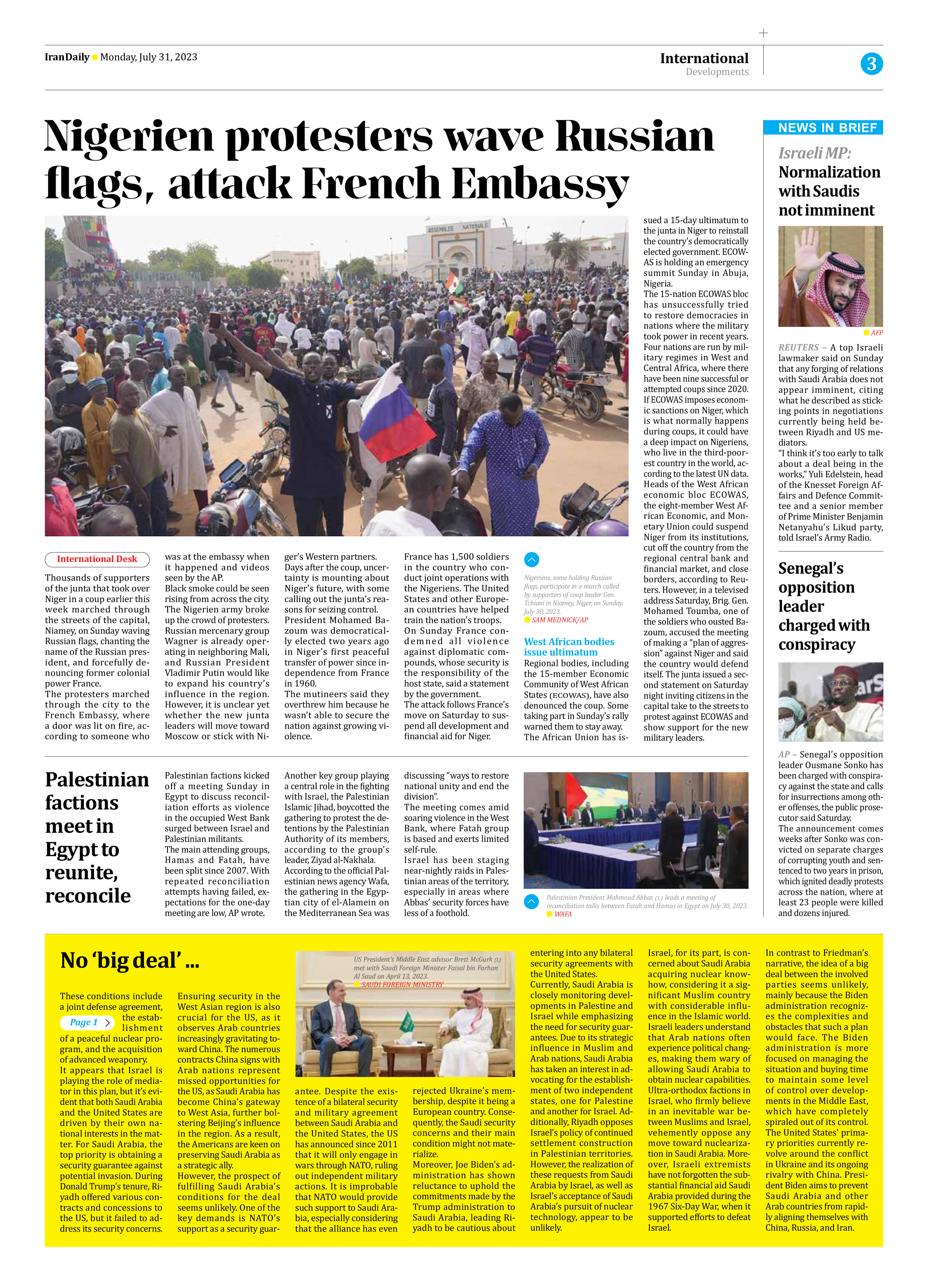
No ‘big deal’ ...
Page 1
These conditions include a joint defense agreement, the establishment of a peaceful nuclear program, and the acquisition of advanced weaponry.
It appears that Israel is playing the role of mediator in this plan, but it’s evident that both Saudi Arabia and the United States are driven by their own national interests in the matter. For Saudi Arabia, the top priority is obtaining a security guarantee against potential invasion. During Donald Trump’s tenure, Riyadh offered various contracts and concessions to the US, but it failed to address its security concerns.
Ensuring security in the West Asian region is also crucial for the US, as it observes Arab countries increasingly gravitating toward China. The numerous contracts China signs with Arab nations represent missed opportunities for the US, as Saudi Arabia has become China’s gateway to West Asia, further bolstering Beijing’s influence in the region. As a result, the Americans are keen on preserving Saudi Arabia as a strategic ally.
However, the prospect of fulfilling Saudi Arabia’s conditions for the deal seems unlikely. One of the key demands is NATO’s support as a security guarantee. Despite the existence of a bilateral security and military agreement between Saudi Arabia and the United States, the US has announced since 2011 that it will only engage in wars through NATO, ruling out independent military actions. It is improbable that NATO would provide such support to Saudi Arabia, especially considering that the alliance has even rejected Ukraine’s membership, despite it being a European country. Consequently, the Saudi security concerns and their main condition might not materialize.
Moreover, Joe Biden’s administration has shown reluctance to uphold the commitments made by the Trump administration to Saudi Arabia, leading Riyadh to be cautious about entering into any bilateral security agreements with the United States.
Currently, Saudi Arabia is closely monitoring developments in Palestine and Israel while emphasizing the need for security guarantees. Due to its strategic influence in Muslim and Arab nations, Saudi Arabia has taken an interest in advocating for the establishment of two independent states, one for Palestine and another for Israel. Additionally, Riyadh opposes Israel’s policy of continued settlement construction in Palestinian territories. However, the realization of these requests from Saudi Arabia by Israel, as well as Israel’s acceptance of Saudi Arabia’s pursuit of nuclear technology, appear to be unlikely.
Israel, for its part, is concerned about Saudi Arabia acquiring nuclear know-how, considering it a significant Muslim country with considerable influence in the Islamic world. Israeli leaders understand that Arab nations often experience political changes, making them wary of allowing Saudi Arabia to obtain nuclear capabilities. Ultra-orthodox factions in Israel, who firmly believe in an inevitable war between Muslims and Israel, vehemently oppose any move toward nuclearization in Saudi Arabia. Moreover, Israeli extremists have not forgotten the substantial financial aid Saudi Arabia provided during the 1967 Six-Day War, when it supported efforts to defeat Israel.
In contrast to Friedman’s narrative, the idea of a big deal between the involved parties seems unlikely, mainly because the Biden administration recognizes the complexities and obstacles that such a plan would face. The Biden administration is more focused on managing the situation and buying time to maintain some level of control over developments in the Middle East, which have completely spiraled out of its control. The United States’ primary priorities currently revolve around the conflict in Ukraine and its ongoing rivalry with China. President Biden aims to prevent Saudi Arabia and other Arab countries from rapidly aligning themselves with China, Russia, and Iran.







